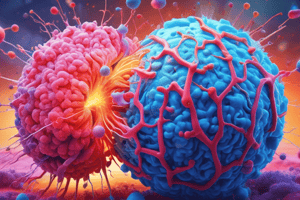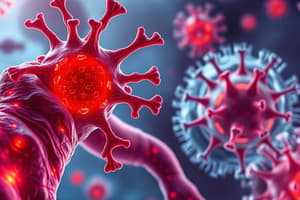Podcast
Questions and Answers
What describes active immunity?
What describes active immunity?
What is the purpose of vaccines?
What is the purpose of vaccines?
Which statement about herd immunity is true?
Which statement about herd immunity is true?
What characteristic is critical for a vaccine to be effective?
What characteristic is critical for a vaccine to be effective?
Signup and view all the answers
Which of the following populations benefit most from herd immunity?
Which of the following populations benefit most from herd immunity?
Signup and view all the answers
What can be included in a vaccine's antigens?
What can be included in a vaccine's antigens?
Signup and view all the answers
Which concept is essential for a successful immunization program?
Which concept is essential for a successful immunization program?
Signup and view all the answers
What is the difference between active immunity and passive immunity?
What is the difference between active immunity and passive immunity?
Signup and view all the answers
Which factor does NOT influence the spread of disease within a community?
Which factor does NOT influence the spread of disease within a community?
Signup and view all the answers
What is the primary reason living pathogens are effective vectors for disease transmission?
What is the primary reason living pathogens are effective vectors for disease transmission?
Signup and view all the answers
How are non-living pathogens typically transmitted?
How are non-living pathogens typically transmitted?
Signup and view all the answers
Which environmental factor is NOT mentioned as a category for disease transmission analysis?
Which environmental factor is NOT mentioned as a category for disease transmission analysis?
Signup and view all the answers
What aspect of international travel was noted as significant in understanding disease transmission?
What aspect of international travel was noted as significant in understanding disease transmission?
Signup and view all the answers
Which of the following statements about pathogens is correct?
Which of the following statements about pathogens is correct?
Signup and view all the answers
What is an example of a measure used to analyze water supply factors related to disease spread?
What is an example of a measure used to analyze water supply factors related to disease spread?
Signup and view all the answers
What is the main reason for the complexity in studying the transmission of pathogens?
What is the main reason for the complexity in studying the transmission of pathogens?
Signup and view all the answers
Which of the following is NOT a category into which environmental factors can be analyzed?
Which of the following is NOT a category into which environmental factors can be analyzed?
Signup and view all the answers
What characteristic of pathogens allows them to be studied continuously by scientists?
What characteristic of pathogens allows them to be studied continuously by scientists?
Signup and view all the answers
Study Notes
Active Immunity and Vaccination
- Active immunity involves the production of one's own antibodies against pathogens due to memory cells.
- Artificial active immunity is gained through artificial encounters (e.g., injections or oral preparations).
- Vaccines are preparations that introduce pathogen antigens, which can be weakened, killed, or inactivated toxins/proteins.
- Vaccination (or immunization) is the process of presenting vaccines to the immune system, creating immunological memory.
- Vaccines must be specific to trigger a proper immune response with minimal side effects.
Herd Immunity and Community Protection
- Herd immunity requires a sufficient number of vaccinated individuals to protect the whole community.
- Increased vaccination rates reduce the spread of infectious agents by decreasing potential carriers.
- Critical for vulnerable populations who cannot be vaccinated, such as newborns, pregnant women, the elderly, and immunocompromised individuals.
Pathogen Transmission and Disease Spread
- Pathogens, not diseases themselves, are responsible for disease transmission.
- Disease spread complexity increases with more individuals involved; factors include population density, hygiene, environmental influences, and pathogen categories.
- Epidemiologists study disease spread categorically, examining environmental factors such as water supply, sanitation, food safety, and climate influences.
Environmental Factors and Mechanisms of Disease Transmission
- Water supply issues may include poor hygiene, stagnant water, and inadequate waste disposal.
- Climate influences include flooding, excessive rain, and environmental conditions that can facilitate pathogen survival.
- Living pathogens thrive in hosts that provide stable temperatures, moisture, and nutrients, while non-living pathogens rely on external mediums for transmission, such as water and food.
Human Influence on Pathogen Transmission
- Human activity significantly impacts the spread of pathogens and disease.
- In the 1990s, 500 million people traveled internationally by commercial flights.
- Over 200 years, the average daily travel distance for the French population increased 1000-fold, and Australia's entry/exit statistics surged 100-fold in 40 years.
Studying That Suits You
Use AI to generate personalized quizzes and flashcards to suit your learning preferences.
Description
Test your knowledge on active immunity, vaccination processes, and the role of herd immunity in community protection. This quiz covers the mechanisms of vaccine action, types of immunity, and the importance of immunization for collective health.




